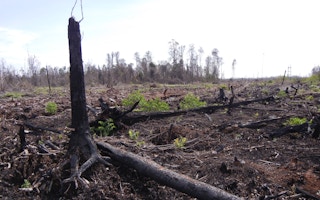In June last year, Singapore, Indonesia and Malaysia suffered their worst haze crisis in more than a decade when illegal forest fires in Riau, Sumatra, enveloped the region in a thick smog and resulted in record-breaking levels of pollution.
To continue reading, subscribe to Eco‑Business.
There's something for everyone. We offer a range of subscription plans.
- Access our stories and receive our Insights Weekly newsletter with the free EB Member plan.
- Unlock unlimited access to our content and archive with EB Circle.
- Publish your content with EB Premium.
Although the Asean (the Association of Southeast Asian Nations) Agreement on Transboundary Haze Pollution was established in 2002 in the wake of the last haze crisis in 1997, Indonesia has yet to ratify it.
The three-month-long haze crisis then cost Southeast Asia an estimated $9 billion from disruptions to air travel, health expenses and other business impacts. Last June, experts estimated that the unhealthy smog, which hit a record of 401 on the Pollution Standards Index, could rack up to S$1.2 billion in economic losses for Singapore.
Fed up with the lack of progress and realising the role that private companies played in causing the haze, Singapore drafted an ambitious anti-haze bill this March that would penalise companies found responsible for causing unhealthy levels of haze affecting Singapore – even if the pollution-causing fires originated beyond the country’s national borders.
The Transboundary Haze Pollution bill was revised and passed in August to include harsher fines of up to S$2 million as well as a widened definition of who can be held responsible. It also enabled the authorities to prevent individuals from leaving Singapore if they had been served notice.
While many agree the Bill might be exactly what is needed to get companies to clean up their act, it remains to be seen if it will lead to genuine change in Riau province - ground zero for most of the illegal burning. Here, many find it hard to resist the temptation to clear land by burning for agricultural expansion into forests and peatlands as it is the cheapest option.
Find out more about the complex factors contributing to the haze in the Eco-Business magazine here.










